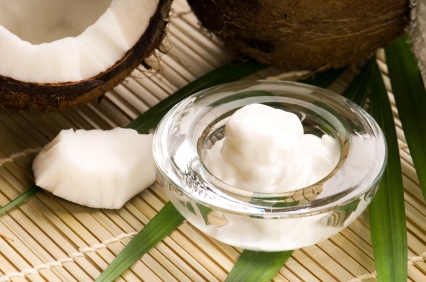The title of this blog post may sound strange, but researchers are so versed in the health-benefits of coconut oil that they are now recommending this medium chain saturated fat as a prevention and treatment of obesity. There are many reasons why we should read more into coconut oil and learn why this saturated fat is a helpful aid in a society that is stricken with man-made diseases like diabetes and obesity. Coconut oil is a medium chain saturated fatty acid. Not all saturated fats are created equal.
Avoid long chain fatty acids, like those found in polyunsaturated fats, found in everything from cakes and candy to crisps and pastries. These contribute toward obesity and weight gain. They are not the healthiest oil for the body and heart. Even so-called nutritionists and health experts are lacking in truth when it comes to fats. The body relies heavily on turning foods into energy in as rapid a timescale as it can complete. Coconut oil supplies the body with calories that can be utilised as immediate energy. Therefore, the saturated fat coconut oil does not contribute toward weight gain or excess body fat.
Coconut Oil for Heart Health
Individuals who eat a coconut-rich diet, comprising up to 60 percent of saturated fat per day, have excellent heart health. Why is this so, if so-called health and dietary experts believe that we should refrain our intake of saturated fats.
Trans fatty acids are what we should be eating less of on a daily basis, but butter and coconut oil are two types of saturated fats that may contribute toward good health. The fact of the matter is that most of us have been scared into fat starvation. Low fat foods are loaded with sugar, which is an addictive ingredient. It’s the only preservative that food manufacturers can add to make the food taste pleasant. Thickeners are also added to low fat produce like yoghurt. Low fat foods eventually contribute toward weight gain and cause unnecessary sugar addiction.
Coconut Oil Contributes Toward Weight Loss
The marvellous traits of medium chain fatty acids, like those found in coconut oil, are that they support a healthy metabolism. We all have a basal metabolic rate, which is the rate at which we burn calories at rest. What if you ate a saturated fat that made your metabolism rocket to burn additional calories and contribute toward weight loss? Would you add it to your diet? Coconut oil is the marvel oil that does this.
When the body is engaged in thermogenesis (burning calories during digestion), the stomach starts to heat. The body is in calorie-burning mode, and this can be felt minutes after eating coconut oil. Around ten percent of the calories we burn on a daily basis are through thermogenesis. A protein-rich diet also burns calories, as protein has a far greater thermogenic influence than carbohydrates. It is important to note that coconut oil is calorific, but if it is taken as part of a healthy diet it may contribute to weight loss.
The Downside to Long Chain Fatty Acids
Polyunsaturated fats are rich in long chain fatty acids. An expert in nutrition and health, Dr Julian Whitaker describes the difference between long and medium chain fatty acids like this: “Long Chain Triglycerides are like heavy wet logs that you put on a small campfire. Keep adding the logs, and soon you have more logs than fire. Medium Chain Triglycerides are like rolled-up newspaper soaked in gasoline. They not only burn brightly, but will burn up the wet logs as well”. There is much research to back up Dr Whitaker’s view.
In Conclusion
Obesity contributes toward many man-made diseases that are plaguing our world today, including diabetes and heart disease. One way to reduce man-made disease is to lose weight. Coconut oil is a medium chain fatty acid that heightens the metabolism, and current research has proven that coconut oil is a wondrous oil that not only encourages weight loss, but also fights fungus and viruses.



